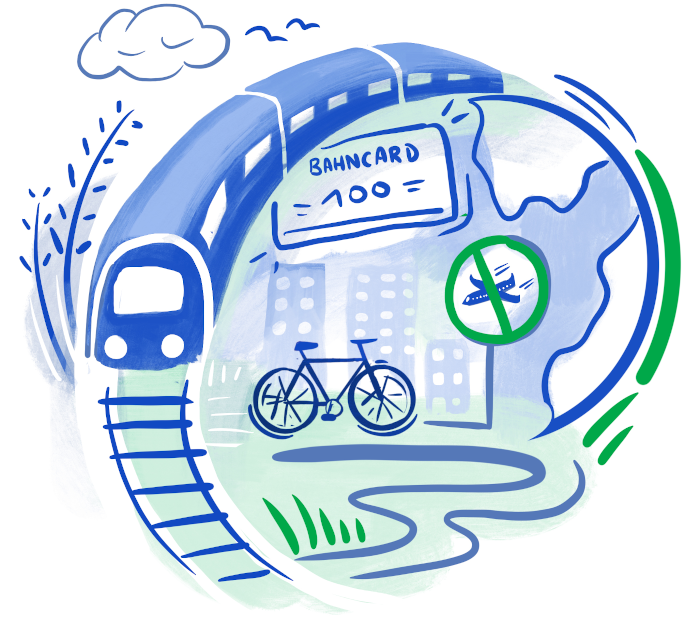Just Mobility

The term "mobility justice" has been around for a number of years and has already seen various uses during this time. For example, Deutsche Bahn introduced the "mobility fair toilet" in 2012. In the same year, the magazine "Focus" declared the term to be "fair to mobility". In this section of the grassroots climate plan, on the other hand, measures are put up for discussion that aim at a just exercise of mobility within the framework of a global 1.5 degree target. Instead of, for example, forbidding all people to fly or drive, we are looking for ways to be mobile in a responsible manner - towards nature and its limited resources, towards ourselves and towards other people. Instead of using the largest and fastest possible vehicle for our own mobility, the challenge for all of us is to learn how to move in an energy-efficient way that is appropriate for the purpose, always with a view to the consequences for the entire globe. This means that instead of thinking only of my advantages or convenience through mobility, we must think of the requirements and effects on a regional and supraregional, even global scale.
One example: While a person from a favela in a South American metropolis is often forced to use every available form of transport, often to cover long distances to work, many people in Germany have alternatives for shaping their individual mobility. Here is another example: Perhaps I am used to commuting to work with my car every day. While driving, I can make phone calls, listen to music and talk to my child. But my workplace can also be reached by using public transport. Although this option involves additional time and effort, it is feasible for me: I can also make phone calls, listen to music and talk to my accompanying child, whilst taking public transport. But I also have an e-cargobike in my garage, which allows me to get to work even faster than by car or public transport. By using this mode of transportation I can't make phone calls or at least I have to stop my bike for a short time. So why have I not yet made a consistent change, but leave it to sporadic bicycle use whenever my bad environmental conscience is weighing on me? Perhaps the measures listed below contain information to convince us of the necessity to not only rethink and "test" our beloved mobility habits, but to change them soon into a sustainable - i.e. responsible - way.
Basically, the discussion of a pure conversion to e-mobility (with unchanged consumption) must be critically questioned. The entire socio-ecological costs of the production and use of electrically powered vehicles (extraction of necessary resources for batteries, production etc.), for example the 'ecological backpack' of a new car, must be taken into account, not just its energy consumption after it is put into operation. There needs to be an extensive switch to public transport instead of individual means of transport, just as in all other areas there needs to be a fundamental change in our lifestyle, which tends to be highly resource-intensive. A green → capitalism cannot effectively - i.e. socially justly - counter climate change, but may even lead to an increase in existing social problems on a global scale.
- Torralba, A., Müller, T., Soldatelli, E.: Pumping the Brakes on E-cars. Unmasking the Fantasy of Green Capitalism. (2019, abgerufen 22.2.2020) https://www.rosalux.de/en/news/id/41271/pumping-the-brakes-on-e-cars/
- Brand, U., Wissen, M. (2017): Imperiale Lebensweise. Zur Ausbeutung von Mensch und Natur im Globalen Kapitalismus, München: oekom Verlag
- Kern, B. (2019): Das Märchen vom grünen Wachstum. Plädoyer für eine solidarische und nachhaltige Gesellschaft, Zürich: rotpunktverlag